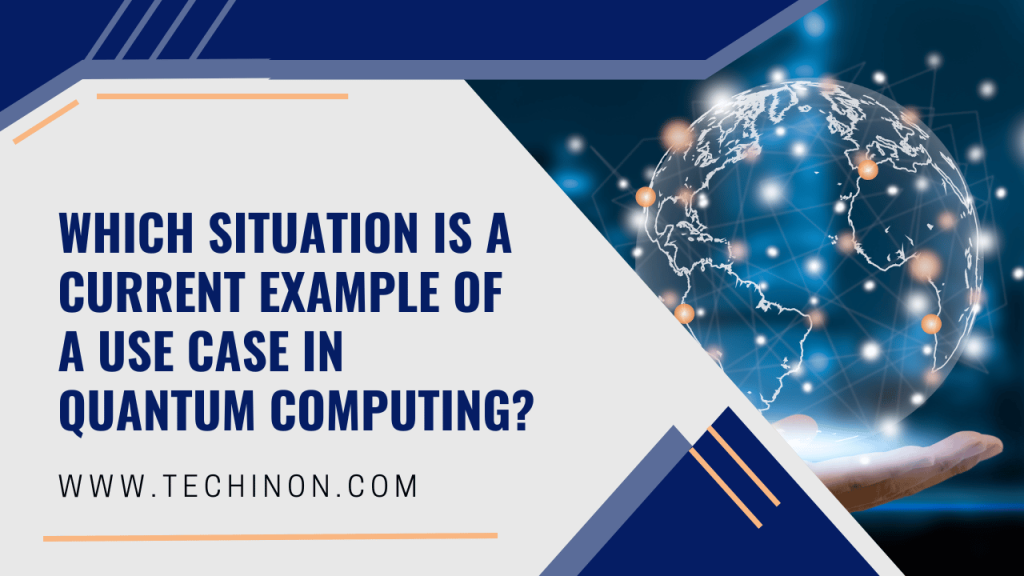Introduction
In the realm of cutting-edge technology, quantum computing stands as a beacon of innovation, promising to reshape industries, accelerate scientific discoveries, and enhance our understanding of the universe. As we delve into the fascinating landscape of quantum computing, we unveil a myriad of real-world applications that harness the unique properties of quantum mechanics. From quantum cryptography to quantum optimization, this article embarks on a journey to explore which situation is a current example of a use case in quantum computing?
Quantum Cryptography: A New Era of Secure Communication
In a world riddled with cyber threats, quantum cryptography emerges as a game-changer in ensuring data security. Traditional encryption methods can be vulnerable to attacks by quantum computers, but quantum cryptography relies on the principles of quantum mechanics, such as the phenomenon of entanglement. This enables the creation of unbreakable encryption keys, ensuring that data remains secure even against the most advanced hacking techniques. Industries dealing with sensitive information, from financial institutions to government agencies, are finding solace in the impenetrable shield of quantum cryptography.
Quantum Simulation: Illuminating Complex Systems
Quantum simulation opens a door to a new era of scientific exploration. Traditional computers struggle to simulate the behaviors of intricate quantum systems, but quantum computers excel in modeling complex molecules, materials, and natural phenomena. This capability accelerates drug discovery, material design, and the understanding of quantum interactions. Scientists can now unveil the secrets of molecules and materials at an unprecedented pace, driving breakthroughs in fields ranging from chemistry to material science.
Quantum Machine Learning: Pioneering Intelligence
Quantum machine learning fuses two revolutionary technologies, giving birth to a new era of artificial intelligence. Quantum computers process information exponentially faster than classical computers, enabling more efficient training of machine learning models. This results in enhanced pattern recognition, optimization, and data analysis. Industries are leveraging quantum machine learning to optimize supply chains, develop advanced predictive models, and even improve medical diagnostics.
Quantum Algorithms: Cracking the Code of Complexity
Complex problems that challenge classical computers can find their match in quantum algorithms. Algorithms like Shor’s algorithm have the potential to crack widely-used cryptographic systems, raising both concerns and opportunities in the realm of digital security. Moreover, quantum algorithms can streamline optimization challenges, benefiting industries from logistics to finance by finding optimal solutions faster than ever before.
Quantum Communication: Bridging Distances Instantaneously
Imagine transmitting information instantaneously across vast distances. Quantum communication harnesses the phenomenon of entanglement to achieve precisely that. Quantum communication networks promise unhackable, instantaneous data transfer, rendering conventional eavesdropping methods obsolete. Industries are exploring quantum communication for secure financial transactions, military communications, and satellite-based quantum key distribution.
Quantum Optimization: Solving Complex Problems Efficiently
From route optimization for delivery trucks to protein folding simulations, quantum optimization transforms industries by solving complex problems efficiently. Quantum annealing, a specialized quantum computing approach, finds optimal solutions by simulating the behavior of quantum systems. This has profound implications for fields such as finance, logistics, and artificial intelligence, where solving optimization challenges can lead to substantial cost savings and performance improvements.
Quantum Chemistry: Transforming Drug Discovery
The quest for new drugs is arduous, but quantum chemistry is ushering in a new era of drug discovery. Quantum computers can accurately model the behavior of molecules, predicting their interactions and properties. This expedites the identification of potential drug candidates, reducing the time and cost required for bringing new therapies to market. Quantum chemistry is poised to revolutionize the pharmaceutical industry and improve global healthcare outcomes.
Quantum Sensors: Precision Beyond Measure
Quantum sensors harness quantum phenomena to achieve unprecedented levels of precision in sensing and imaging. Quantum entanglement and superposition enable sensors that can detect faint magnetic fields, gravitational waves, and even single photons. Industries ranging from medical imaging to mineral exploration are benefitting from the remarkable sensitivity and accuracy offered by quantum sensors.
Quantum Materials: Crafting the Future
Quantum materials are at the heart of numerous technological advancements. These materials exhibit unique properties due to quantum effects, enabling breakthroughs in electronics, energy storage, and more. Industries are leveraging quantum materials to create faster and more efficient electronic devices, advanced energy storage solutions, and even quantum-based computing components.
Frequently Asked Questions
Q1: What are some real-world examples of quantum computing applications?
Quantum computing has diverse applications, including quantum cryptography, quantum simulation, and quantum machine learning. It’s used to enhance data security, accelerate scientific discoveries, and revolutionize artificial intelligence.
Q2: How is quantum computing being used in cryptography?
Quantum cryptography uses quantum principles to create unbreakable encryption keys, ensuring secure communication in a world vulnerable to cyber threats.
Q3: Can you explain quantum simulation use cases?
Quantum simulation accelerates scientific discoveries by accurately modeling complex systems, such as molecules and materials, leading to advancements in drug discovery and material science.
Q4: What role does quantum computing play in machine learning?
Quantum machine learning leverages the speed of quantum computers to optimize machine learning models, enhancing pattern recognition, optimization, and data analysis.
Q5: How are quantum algorithms applied in scientific research?
Quantum algorithms solve complex problems efficiently, benefiting fields like optimization, cryptography, and simulations in scientific research.
Q6: Explain the concept of quantum communication and its uses.
Quantum communication uses entanglement to achieve secure, instantaneous data transfer, revolutionizing industries such as finance, military, and satellite communications.
Q7: What are the benefits of quantum error correction in computing?
Quantum error correction ensures the reliability of quantum computations, paving the way for more stable and accurate quantum technologies.
Q8: How does quantum superposition impact data processing?
Quantum superposition enables quantum computers to process multiple possibilities simultaneously, exponentially speeding up data processing and analysis.
Q9: Can you elaborate on the role of quantum entanglement in technology?
Quantum entanglement allows for the creation of highly sensitive quantum sensors and enables secure quantum communication, transforming industries reliant on accurate measurements and secure data transmission.
Q10: What are some practical quantum sensing applications?
Quantum sensors are used in various industries, such as medical imaging, mineral exploration, and environmental monitoring, due to their exceptional accuracy and sensitivity.
Also Read: Which Technology Will Quantum Computing Impact Most Significantly?
Final Words
As we embark on this journey through the quantum realm, it becomes evident that the applications of quantum computing are boundless. From ensuring unbreakable data security to revolutionizing drug discovery and global communication, quantum computing is ushering in an era of possibilities previously deemed unattainable. While challenges persist, the excitement and momentum surrounding quantum technologies continue to grow, igniting a spark of curiosity and innovation that has the potential to elevate humanity to unprecedented heights. The quantum revolution is here, and its positive impact is palpable, shaping a future that is both promising and transformative.
To conclude, our aim with this article on “Which Situation is a Current Example of a Use Case in Quantum Computing?” has been to equip you with the necessary tools and knowledge to make informed decisions and overcome any challenges you may encounter.
Iva Ort is an ingenious wordsmith and captivating blogger whose tales leap off the screen and into your imagination. With a pen as her wand, she weaves enchanting stories and insightful articles, leaving readers spellbound and craving more.

